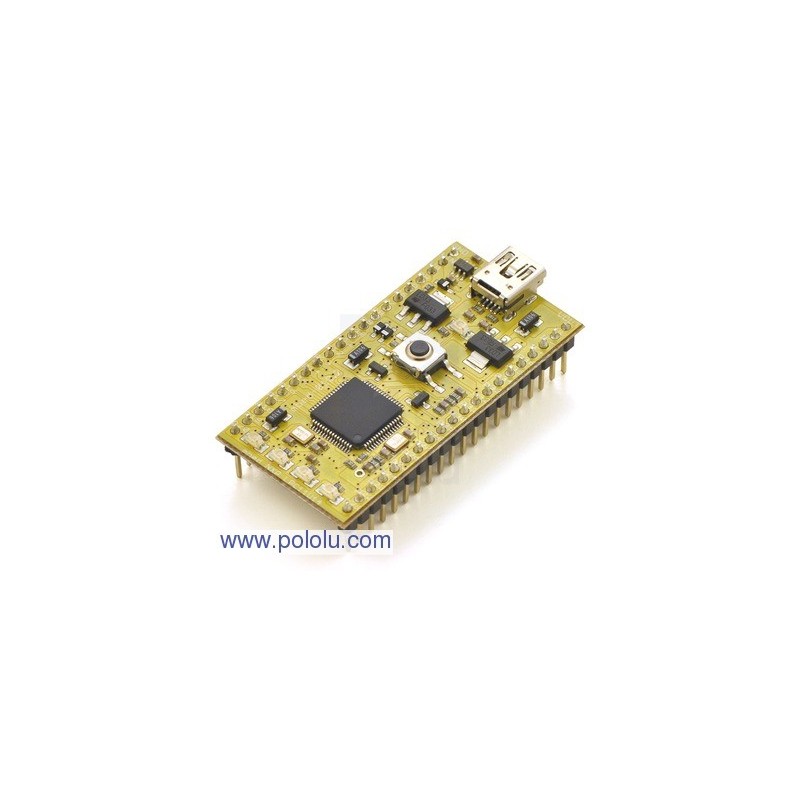



203,64 zł Netto
Płytka rozwojowa oparta na mikrokontrolerze NXP LPC11U24 umożliwia szybkie rozpoczęcie pracy z mikrokontrolerami ARM Cortex-M0 w środowisku mbed. Płytka sprawdza się w projektach edukacyjnych, prototypach systemów wbudowanych oraz aplikacjach sterujących i komunikacyjnych wymagających prostego programowania przez USB i elastycznej konfiguracji wejść oraz wyjść. Pololu 2154
Płytka rozwojowa oparta na mikrokontrolerze NXP LPC11U24 przeznaczona do nauki i prototypowania aplikacji z wykorzystaniem środowiska ARM mbed, dostępna w ofercie firmy Pololu. Układ LPC11U24 z rdzeniem ARM Cortex-M0 zapewnia energooszczędną pracę oraz wystarczającą wydajność do realizacji projektów sterujących, komunikacyjnych i edukacyjnych. Wbudowany interfejs USB umożliwia programowanie płytki bez użycia zewnętrznych programatorów, a także realizację funkcji urządzenia USB w tworzonych aplikacjach. Płytka oferuje wyprowadzone linie GPIO, interfejsy komunikacyjne oraz zgodność z ekosystemem ARM mbed, co ułatwia szybkie uruchomienie projektów i integrację z czujnikami oraz modułami zewnętrznymi.
Producent BTC Korporacja sp. z o. o. Lwowska 5 05-120 Legionowo Polska sprzedaz@kamami.pl 22 767 36 20
Osoba odpowiedzialna BTC Korporacja sp. z o. o. Lwowska 5 05-120 Legionowo Polska sprzedaz@kamami.pl 22 767 36 20
Moduł Freescale TWR-PROTO rozszerza możliwości systemu Tower, umożliwiając budowę i testowanie własnych układów na obszarze prototypowym. Dzięki pełnemu dostępowi do sygnałów magistrali stanowi idealne narzędzie do eksperymentowania, projektowania i integracji niestandardowych rozwiązań sprzętowych.
Brak towaru
Płytka rozwojowa oparta na mikrokontrolerze NXP LPC11U24 umożliwia szybkie rozpoczęcie pracy z mikrokontrolerami ARM Cortex-M0 w środowisku mbed. Płytka sprawdza się w projektach edukacyjnych, prototypach systemów wbudowanych oraz aplikacjach sterujących i komunikacyjnych wymagających prostego programowania przez USB i elastycznej konfiguracji wejść oraz wyjść. Pololu 2154
Moduł z wyświetlaczem LCD 4,3-cale przeznaczony do użycia z zestawami uruchomieniowymi firmy Freescale. Jest częścią systemu Freescale Tower. LCD TWR-LCD-RGB
Moduł wyprodukowany przez firmę NGX Technologies przeznaczony do użycia z modułami LPC1788, LPC185x, LPC435x Xplorer++. Został wyposażony w m.in. wyświetlacz LCD, cztery złącze interfejsu RS232, potencjometr, diody LED oraz przyciski do dyspozycji użytkownika.
Zestaw rozwojowy oparty na procesorze Vybrid® VF61NS151CMK50 wyposażony w dwa rdzenie: Cortex-A5 o częstotliwości 500 MHz oraz Cortex-M4 o częstotliwości 167 MHz. Moduł ma wbudowaną pamięć DDR3 128 MB oraz Flash 256 MB. TWR-VF65GS10
TTWR-WIFI-AR4100 to kompletne, certyfikowane rozwiązanie Wi-Fi 802.11n dla platformy Freescale Tower System, idealne do szybkiego prototypowania i wdrożeń produkcyjnych. Dzięki niskiemu poborowi mocy, wysokiej jakości torowi RF oraz gotowemu wsparciu programowemu MQX, moduł doskonale sprawdzi się w aplikacjach IoT, automatyki przemysłowej, systemów sieciowych i urządzeń embedded, gdzie liczy się niezawodność, energooszczędność i krótki czas wprowadzenia produktu na rynek.
MYD-LPC1850 to kompletna i wydajna platforma rozwojowa dla mikrokontrolerów NXP LPC185x, idealna do projektów takich jak automatyka przemysłowa, sterowanie silnikami, robotyka, systemy automotive , urządzenia medyczne czy embedded audio. Bogaty zestaw interfejsów, duża ilość pamięci zewnętrznej oraz gotowe przykłady MDK-ARM znacząco skracają czas wdrożenia i czynią tę płytę doskonałym narzędziem zarówno do nauki, jak i profesjonalnego prototypowania.
Płytka rozwojowa FRDM-CR20A płytka rozszerzeń (shield) zawierająca bezprzewodowy nadajnik MCR20A 2.4 GHz, kompatybilny z istniejącymi platformami rozwojowymi Freedom - FRDM-K64F i FRDM-KL46Z. FRDM-CR20A
NXP MRB-KW019032EU to modułowy zestaw oparty na 32-bitowym mikrokontrolerze z rdzeniem ARM Cortex M0 48 MHz, wyposażona w moduł radiowy 868 MHz. MRB-KW019032EU
FRDM-K22F-AGM01 to zestaw płytek rozwojowych zawierający płytę bazową oraz płytę z zestawem 9-osiowych czujników z akcelerometrem, żyroskopem oraz magnetometrem. FRDM-K22F-AGM01
Brak towaru
IMXRT1050-EVKB to zestaw ewaluacyjny od NXP z procesorem i.MX RT1050 ARM Cortex-M7 600 MHz, 256 MB pamięci SDRAM, złącze USB Host oraz OTG, złącze Ethernet oraz slot na kartę SD. IMXRT1050-EVKB
Zestaw ewaluacyjny i.MX RT1050, Cortex-M7, częstotliwość 600 MHz, 256 MB SRAM, 512 MB Flash
QN9080-DK to zestaw rozwojowy z układem QN9080 BLE SOC firmy NXP. Układ ten posiada zintegrowany 32-bitowy rdzeń ARM Cortex-M4F oraz układ do łączności Bluetooth (BLE v5.0). W zestawie oprócz płytki z układem QN9080 znajduje się dongle USB (również z układem QN9080) co pozwala na realizację komunikacji master/slave między dwoma układami QN9080. QN9080-DK
Zestaw rozwojowy zawierający moduł A71CH Plug&Trust, umożliwiający łatwe i szybkie tworzenie bezpiecznych aplikacji IoT. NXP OM3710/A71CHARD
Brak towaru
MCIMX6ULL-EVK to zestaw ewaluacyjny od NXT z procesorem i.MX6ULL ARM Cortex-A7 900 MHz, 4 GB pamięci SDRAM oraz złącze USB Host oraz OTG, złącze Ethernet oraz slot na kartę SD. MCIMX6ULL-EVK
Zestaw ewaluacyjny FRDM-HB2001-EVM składający się z płytki bazowej FRDM-KL25Z oraz płytki rozszerzeń ze sterownikiem silników DC MC33HB2001. NXP FRDM-HB2001-EVM
Brak towaru

Płytka rozwojowa oparta na mikrokontrolerze NXP LPC11U24 umożliwia szybkie rozpoczęcie pracy z mikrokontrolerami ARM Cortex-M0 w środowisku mbed. Płytka sprawdza się w projektach edukacyjnych, prototypach systemów wbudowanych oraz aplikacjach sterujących i komunikacyjnych wymagających prostego programowania przez USB i elastycznej konfiguracji wejść oraz wyjść. Pololu 2154
